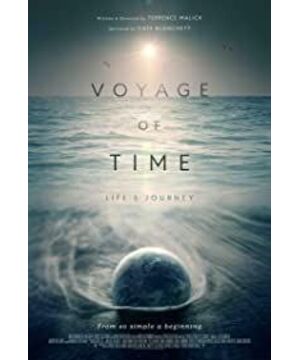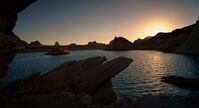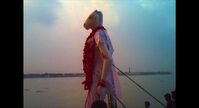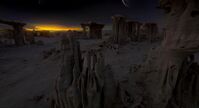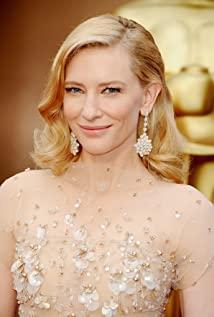The story begins with the Big Bang, and through the creation of nebulae to the cooling of the universe and the emergence of the Milky Way, life begins in a background intertwined with disorder and order. From the sky to the ocean, from the appearance of cells to the biological plants on the bottom of the sea, time and space change, and the world is rapidly evolving. Everything seems small on the scale of time and space, but in terms of its meaning, every step is great.
In addition to the presentation of the evolution of life, the film is also interspersed with the development and changes of human society. Unlike the beautiful natural part, which was shot with civilian equipment (some may even be phone cameras), it looks jittery and rough. From Africa to India, to the Middle East to the Americas, various forms of human society have been recorded and become raw materials. Different races, different skin colors, across the entire planet, there is poverty, abundance, peace and killing. These themes of human society and the steps of cosmic evolution complement each other and become different forms of pursuit of the value of life.
There is also China in the picture. The main content is the display of some folk culture, such as the scene of slaughtering a cow, and the old man doing Tai Chi in the square. As a Chinese, I found this part interesting. Not surprisingly, it shows the stereotype of the East in the Western world—mysterious, primitive, and backward. Prosperity belongs to the West, and the center of modern human civilization also belongs to them. Other countries and regions are only exotic, and they are used to describe a glimpse beyond the "mainstream mainstream".
I am a documentary lover. Watched many different types of documentaries in the early years, and they, along with the endless Star Trek, became my bedtime show.
Of all the genres, I especially like geography, nature and cosmology. Human Planet, Earth Pulse, Life Pulse, Africa, Frozen Planet, Miracles of the Solar System, Miracles of the Universe, Understanding the Universe with Hawking, The Speed of Life, "The Great Migration"...Thanks to the BBC, Discovery and National Geographic for so many wonderful productions that made me feel very warm in those years. On a long winter night, watching an episode of "Travel to the Edge of the Universe" and then opening the curtains and looking at the sky, there will be a feeling of not knowing where you are in a trance.
For me personally, documentaries are healing. They're not like movies that make me want to get emotionally involved or write something about them, they just calm me down. Opening a documentary means that this is a period of time that is purely your own. You only need to immerse yourself in it, and understanding knowledge is secondary. It is human instinct to go back to the past, the future or the mother. The documentary perspective is scientific, but when you are in it, and you are infinitely close to nature, the planet or the universe, the emotions at this time are often close to religious experience - or it can be said like this: Even if the documentary depicts everyday life, it does not point to the here and now, but to the ultimate meaning of existence beyond experience.
When watching documentaries, picture quality is very important. I tried watching it on some online websites before, but I quickly felt that it was difficult to experience the beauty of the delicate picture, so I changed to find the source of the film by myself. In the early years, the network speed was not enough, and it took a long time to download a film; now I finally have a good life, and dozens of gigabytes of films are not a problem.
However, people are always greedy, looking at those beautiful pictures, I always think how good it would be if they could be shown in the theater. That picture, that sound, that star, that sea...it's just heaven. Then think of those bad movies that take over the screen. It's just that the audience attendance rate is high. In some halls, after a movie, the audience does not exceed ten people, slouching in the empty seats, which is really a pity for those equipment.
Of course this is just fantasy. It is very difficult for today's market-oriented cinemas to release documentaries. The audience's demand orientation and economic interest orientation are both commercial films, and they are also the ones that create box office miracles. Every year, the number of movies released in theaters is limited, and there are still a lot of movies that have no chance of being released after they are filmed. In addition, documentaries are mostly broadcast on TV stations in China, and viewers do not have the habit of paying for them. A few years ago, although "A Bite of China" was all the rage, it was a box office hit when it was made into a movie to test the waters.
Watching documentaries at home, if you have a big screen and good sound equipment, is also very enjoyable. But this is still a luxury for most people. So what to do?
What else can be done, it's better to see it than not to see it.
Actually nothing. Good sound and pictures are only part of the "enjoyment" when watching a movie, not the essence of a documentary. The real value lies in those few dozen minutes that you turn on the screen and interact with the content. In that brief time, you are guided by these stories, opening up new perspectives on the world and yourself.
Going back to A Journey Through Time, I actually didn't like the narration part of the movie. Cate Blanchett's voice is certainly charming, but those babbling lines are somewhat awkward, perhaps because the director wants to convey the mystery and solemnity of the connection between the human soul and Mother Earth. But at this moment, apart from nature, everything artificial is superfluous.
This article was first published on the WeChat public account: Burning Expedition (TBC1096). Welcome to pay attention.
View more about Voyage of Time: Life's Journey reviews


